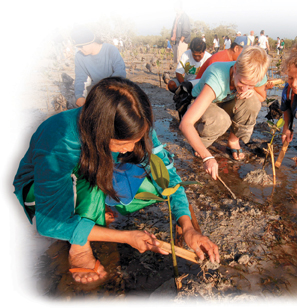Understanding and Using Science Science will keep changing as long as humans keep wondering about nature. We invite you to join us in that wonder and exploration as you read this book. Think of this text, not as an encyclopedia, but as a “user's guide” to the study of life. Don't just memorize today's scientific facts and ideas. And please don't believe them! Instead, try to understand how scientists developed those ideas. Try to see the thinking behind experiments we describe. Try to pose the kinds of questions scientists ask.
If you learn to think as scientists think, you will understand the process of science and be comfortable in a world that will keep changing throughout your life. Understanding science will help you make complex decisions that also involve cultural customs, values, and ethical standards.
Furthermore, understanding biology will help you realize that we humans can predict the consequences of our actions and take an active role in directing our future and that of our planet. In our society, scientists make recommendations about big public policy decisions, but they don't make the decisions. Who makes the decisions? Citizens of our democracy do. In a few years, you will be able to exercise the rights of a voting citizen, influencing public policy by the ballots you cast and the messages you send public officials. That's why it is important that you understand how science works and appreciate both the power and the limitations of science.

FIGURE 1–11 Using Science in Everyday Life These student volunteers are planting mangrove saplings as part of a mangrove restoration project.
1.2 Assessment

-
Review List the attitudes that lead scientists to explore and discover.
Explain What does it mean to describe a scientist as skeptical? Why is skepticism an important quality in a scientist?
-
Review What is peer review?
Apply Concepts An advertisement claims that studies of a new sports drink show it boosts energy. You discover that none of the study results have been peer-reviewed. What would you tell consumers who are considering buying this product?
-
Review What is a scientific theory?
Compare and Contrast How does use of the word theory differ in science and in daily life?
-
Review How is the use of science related to its context in society?
Explain Describe some of the limitations of science.
Apply Concepts A study shows that a new pesticide is safe for use on food crops. The researcher who conducted the study works for the pesticide company. What potential biases may have affected the study?
Apply the Big idea
Explain in your own words why science is considered a “way of knowing.”

Table of Contents
- Formulas and Equations
- Applying Formulas and Equations
- Mean, Median, and Mode
- Estimation
- Using Measurements in Calculations
- Effects of Measurement Errors
- Accuracy
- Precision
- Comparing Accuracy and Precision
- Significant Figures
- Calculating With Significant Figures
- Scientific Notation
- Calculating With Scientific Notation
- Dimensional Analysis
- Applying Dimensional Analysis




